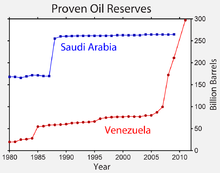- Oil reserves in Venezuela
-
 Orinoco Oil Belt assessment unit, USGS
Orinoco Oil Belt assessment unit, USGS
The proven oil reserves in Venezuela are claimed to be the largest in the world, according to an announcement in early 2011 by President Hugo Chavez and the Venezuelan government. The reported proven reserves reach 297 billion barrels (4.72×1010 m3), surpassing that of the previous long-term world leader, Saudi Arabia.[1] OPEC said that Saudi Arabia's reserves stood at 265 billion barrels (4.21×1010 m3) in 2009.[2]
According to the United States Geological Survey (a bureau of the United States Department of the Interior that employs approximately 8,670 people), the Orinoco Belt alone is estimated to contain 900–1,400 billion barrels (2.2×1011 m3) of heavy crude in proven and unproven deposits.[3] Of this, the United States Geological Survey estimated that 380–652 billion barrels (1.037×1011 m3) could be technically recoverable, which would make Venezuela's total recoverable reserves (proven and unproven) among the largest in the world.[4][5] The technology needed to recover ultra-heavy crude oil, such as in most of the Orinoco Belt, may be much more complex and expensive than that of Saudi Arabia's light oil industry.[1]
Already by 2009, Venezuela reported 211.17 billion barrels (3.3573×1010 m3) of conventional oil reserves, the largest of any country in South America.[6] In 2008, it had net oil exports of 1.189 Mbbl/d (189,000 m3/d) to the United States.[7] As a result of the lack of transparency in the country's accounting, Venezuela's true level of oil production is difficult to determine, but OPEC analysts estimate that it produced around 2.47 Mbbl/d (393,000 m3/d) of oil in 2009. This would give it 234 years of remaining production at current rates.
In October 2007, the Venezuelan government said its proven oil reserves had risen to 100 billion barrels (16×109 m3). The energy and oil ministry said it had certified an additional 12.4 billion barrels (2.0×109 m3) of proven reserves in the country's Faja del Orinoco region.[8] In February 2008, Venezuelan proven oil reserves were 172 billion barrels (27×109 m3).[9]
In addition to conventional oil, Venezuela has oil sands deposits similar in size to those of Canada (approximately equal to the world's reserves of conventional oil). Venezuela's Orinoco tar sands are less viscous than Canada's Athabasca oil sands – meaning they can be produced by more conventional means – but they are buried deeper, meaning they cannot be extracted by surface mining. Estimates of the recoverable reserves of the Orinoco Belt range from 100 billion barrels (16×109 m3) to 270 billion barrels (43×109 m3). In 2009, USGS updated this value to 513 billion barrels (8.16×1010 m3).[10]
Venezuela's development of its oil reserves has been affected by political unrest in recent years. In late 2002 nearly half of the workers at the state oil company PDVSA went on strike, after which the company fired 18,000 of them. The crude oil that Venezuela has is very heavy by international standards, and as a result much of it must be processed by specialized domestic and international refineries. Venezuela continues to be one of the largest suppliers of oil to the United States, sending about 1.4 million barrels per day (220×103 m3/d) to the U.S. Venezuela is also a major oil refiner and the owner of the Citgo gasoline chain.[11]
References
- ^ a b Venezuela: Oil reserves surpasses Saudi Arabia's at english.ahram.org.eg
- ^ Venezuela Says Oil Reserves Surpass Saudi Arabia's Reuters at CNBC.
- ^ Gonzalez, O., Ernandez, J., Chaban, F., and Bauza, L. (2006). "Screening of suitable exploitation technologies on the Orinoco Oil Belt applying geostatistical methods". World Heavy Oil Conference, Beijing, China November 12–15, 2006 Proceedings. Paper 2006–774. pp. 12.
- ^ Schenk C.J., Cook, T.A., Charpentier, R.R., Pollastro, R.M., Klett, T.R., Tennyson, M.E., Kirschbaum, M.A., Brownfield, M.E., and Pitman, J.K. (2009). "An estimate of recoverable heavy oil resources of the Orinoco Oil Belt, Venezuela: U.S. Geological Survey Fact Sheet 2009–3028". http://pubs.usgs.gov/fs/2009/3028/.
- ^ Venezuela oil 'may double Saudi Arabia' BBC
- ^ OPEC data at opec.org
- ^ EIA data at tonto.eia.doe.gov
- ^ Matthew Walter (2007-10-07). "Venezuela's Proven Oil Reserves Rise to 100 billion barrels (16×109 m3)". Bloomberg. http://www.bloomberg.com/apps/news?pid=20601086&sid=aaI3fdsVdKLk. Retrieved 2008-01-05.
- ^ "OPEC Facts and figures" (in en). http://www.opec.org/home/PowerPoint/Reserves/OPECshareWorldcrude.htm. Retrieved 13 March 2010.[dead link]
- ^ "An Estimate of Recoverable Heavy Oil Resources of the Orinoco Oil Belt, Venezuela" (in en). USGS. 11 January 2010. http://pubs.usgs.gov/fs/2009/3028/pdf/FS09-3028.pdf. Retrieved 23 January 2010.
- ^ "Venezuela Oil". Country Analysis Briefs. US Energy Information Administration. 2007. http://www.eia.doe.gov/emeu/cabs/Venezuela/Oil.html. Retrieved 2008-04-27.
Oil reserves by country Listing List of countries by proven oil reservesCountries Canada · Cuba · Ghana · Iran · Iraq · Kuwait · Libya · Mexico · Nigeria · Russia · Saudi Arabia · United Arab Emirates · United States · VenezuelaCategories:- Energy in Venezuela
- Oil reserves by country
- Geology of Venezuela
Wikimedia Foundation. 2010.


